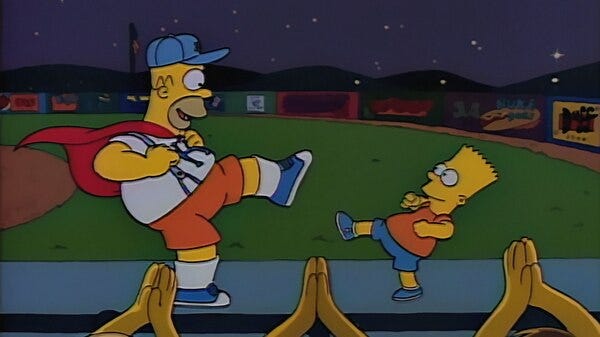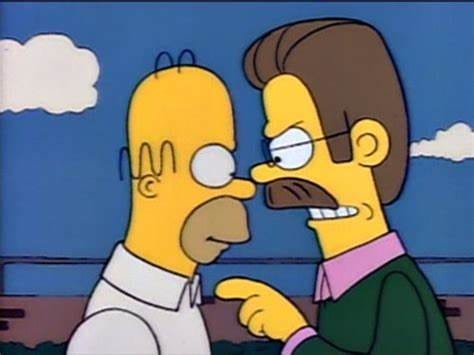OTH- The Simpsons- "Dancin' Homer"/“Dead Putting Society”
Two sports-themed episodes this week, with different goals
Season 2, Episode 5
Aired November 8, 1990
Directed by Mark Kirkland
Written by Ken Levine & David Isaacs
I’ve mentioned this before, but I like the time we spend in Springfield, when it feels like the town is its own vast habitat. Thus far, that hasn’t happened too often, as we’ve mostly been spending time with the family, and to a lesser extent Burns and Smithers, but we’re seeing more of the ecosystem as the series goes along,
As such, going to Capital City for the first time helps to give us an understanding of where Springfield stands in the state, a little city vs the big leagues.
And it unfortunately makes all too much sense why the Simpsons wouldn’t fit in. While at this point, the show has all but accepted that the family isn’t as poor as they’re made out to be, classism is still a real issue that affects them. They’re barely in the halfway point in Springfield’s food chain already, but we see how out of their league they are when we go to Capital City. Despite a lovely serenade from Tony Bennett, what little time we see them spend in the city shows a confused family.
Most of all Homer, the poor schmuck who thinks he can be the next great mascot. And it’s not even that he can’t, even if his dance moves aren’t quite as refined or clever enough for the big leagues. He was only a few games into his career before being promoted, so he didn’t have enough time to fully develop his act. But this is television, and for the script’s parallel of going from minor to major league to work, they couldn’t wait much longer for Homer to go.
What makes “Dancin’ Homer” stand out is how it embraces one of life’s universal truths, that we like stories of pity. Hearing about others have bad turns makes us feel better, as shitty as that sounds. That doesn’t always equate to schadenfreude, but that certainly helps when it’s applicable. Seeing Homer have to resign his new job in a jockstrap makes that applicable here.
Sitcom legends and baseball scholars Ken Levine and David Isaacs do a good job of fitting in with the show’s status quo here, and help to deliver a fine episode. They particularly add in a few good quips about the game from past years in with Mr. Burns We’ll see them again next season, but their first guest duties are a home run.
Season 2, Episode 6
Aired November 15, 1990
Directed by Rich Moore
Written by Jeff Martin
It’s funny to see the surprisingly frequent Karate Kid references in this one after finishing season 2 of Cobra Kai. The more things change, the more they don’t.
I’d say “Dead Putting Society” is most noteworthy of the time we get to spend with the Flanderses. We’ve seen Ned and his kin before, even briefly seeing him in the previous episode, but this is the most significant amount of time we spend with the family. We’re starting to see how religious they are, to the point of irritating Reverend Lovejoy, but also that Ned himself isn’t above his vices. Besides liking a nice Holland pilsner, he’s just as able to get aggravated as anyone. Especially if you live next door to the Simpsons.
Homer’s hatred of Flanders is bizarre and unwarranted on one level, but we are seeing why it’s there. Ned represents the unattainable, the all-accompaning greatness that Homer can’t match. Flanders isn’t perfect either, as we see, but for Homer, he’s everything he can’t be.
The rest of the family doesn’t care, and think that Homer’s reaching, which he mostly is. I don’t think that Homer is the best version of himself he could be, but Marge and his children love him and their life for what they are, and that’s reason enough to let the Flanders be.
And yet… there is something punchable about Flanders. He’s obnoxiously cheerful, and while his intentions are good, I see the potential for smugness in his responses. We don’t learn enough about Maude or their children this week, but I can understand why Homer gets frustrated with at least Ned.
So Homer then tries to push his neighborly feud onto Bart, who wants him to take down Todd, but he’s just not buying. I like that, frankly. This shows that Bart isn’t as much of a bad kid as he’s made out to be, and he just wants to be at peace sometimes. He plays ball (er, golf ball) to please Homer, but this isn’t his thing, and only learns just enough to break even with him.
“Dead Putting Society” is a decently clever episode, but not one that especially soars. My favorite bits have to be the announcer of the minigolf tournament, who takes this WAY too seriously, like this is the Masters Tournament. That alone makes it a winner.
Stray Observations:
Sorry again for the rush job, but work has been draining my energy. I also feel like these episodes didn’t give me much to work with, but that’s probably just me.
But yo, how good is Cobra Kai, right? No spoilers, please.
Chalkboard Gag Wars- “I will not trade pants with others” vs “I am not a 32 year old woman”. The latter is a clear lie, which is why it wins. The story behind that one is fun, too- from what I’ve come to understand, Nancy Cartwright was asked to not do interviews or promotions at the very beginning of the series run, as Fox didn’t want audiences to know that Bart was voiced by a woman. I believe by the second season, this embargo was lifted, and it became public knowledge who voiced everyone’s favorite little hellion.
Couch Gag Wars- Maggie coming out of Marge’s hair vs the pets joining the family. Pets win every time.
lol, expecting
So Bleeding Gums Murphy did a Fergie. Or Fergie did a Murphy.
“Bart was strangely quiet. He would later explain he was confused by feelings of respect for me. It wouldn't last.”
Y’no, for all of the movie references that the series does, including more contemporary ones, it’s surprising that they didn’t bring up Bull Durham at all in “Dancin’ Homer”. That’s THE minor league movie, and quite recent, to boot.
Do y’all remember Playmates’ Simpsons action figure lines? I had a couple of their figures, and one of which was Dancin’ Homer. I’m not sure why I got him in particular, besides wanting some of the family, but missing the first wave. I don’t remember which other figures I owned, but I did have the arcade playset that came with Jimbo, and remember being disappointed that Homer didn’t have any soundbites for that set.
I too would like elf grass.
“I am studying for the Math Fair. If I win, I get a brand new protractor.” “Too bad we don’t live on a farm.”
Before someone uses their Comic Book Guy voice and bring up that we saw Bart in a library at the end of “Bart the General”… 1- shut up nerd. 2- I consider that to be a non-canon aside. 3- Seriously, who cares? It’s funny that Bart doesn’t seem to understand what a library is.
Soooo, is Lisa teaching Bart meditation cultural appropriation? It definitely is the neutral meaning of the term, which to be fair, is often left out when discussing cultural appropriation. I don’t think it crosses a line the way Daniel LaRusso’s eternal fixation on Mr. Miyagi’s teachings do, but I can understand why one would could consider this to trivialize Buddhism. And it’s funny, this is well before Lisa becomes a practicing Buddhist.
Well, we see a makeup-less Krusty again this week. Weird.
New Character Column- The Capital City Goofball makes his debut in the former episode, voiced by legend Tom Poston. He’ll become a fun . We also meet Maude Flanders for the first time, as she has been absent in previous Flanders outings. She’s notable for um, certain reasons. I also want to take this chance to talk about Maggie Roswell, who voices both Maude and Helen Lovejoy. She’s noted for having the perfect “normal” woman voice, which she uses to great effect for both characters.
it’s a small world after all- As mentioned earlier, Ken Levine and David Isaacs are sitcom legends. Their most important works here, at least to this blog, would be their scripts from seasons 5-8 of M*A*S*H and their material across the entire 11 seasons of Cheers. Both of which won their own Emmys for the latter series’ first win for Outstanding Comedy Series. Levine, who at the time was a minor league announcer, and has since been promoted to the majors, voiced the minor league announcer, Dan Hoard.
But while we’re talking about Levine, his blog is an invaluable resource for screenwriting, sitcom asides, baseball anecdotes, and anything you can think of. This post talks about this particular episode.




